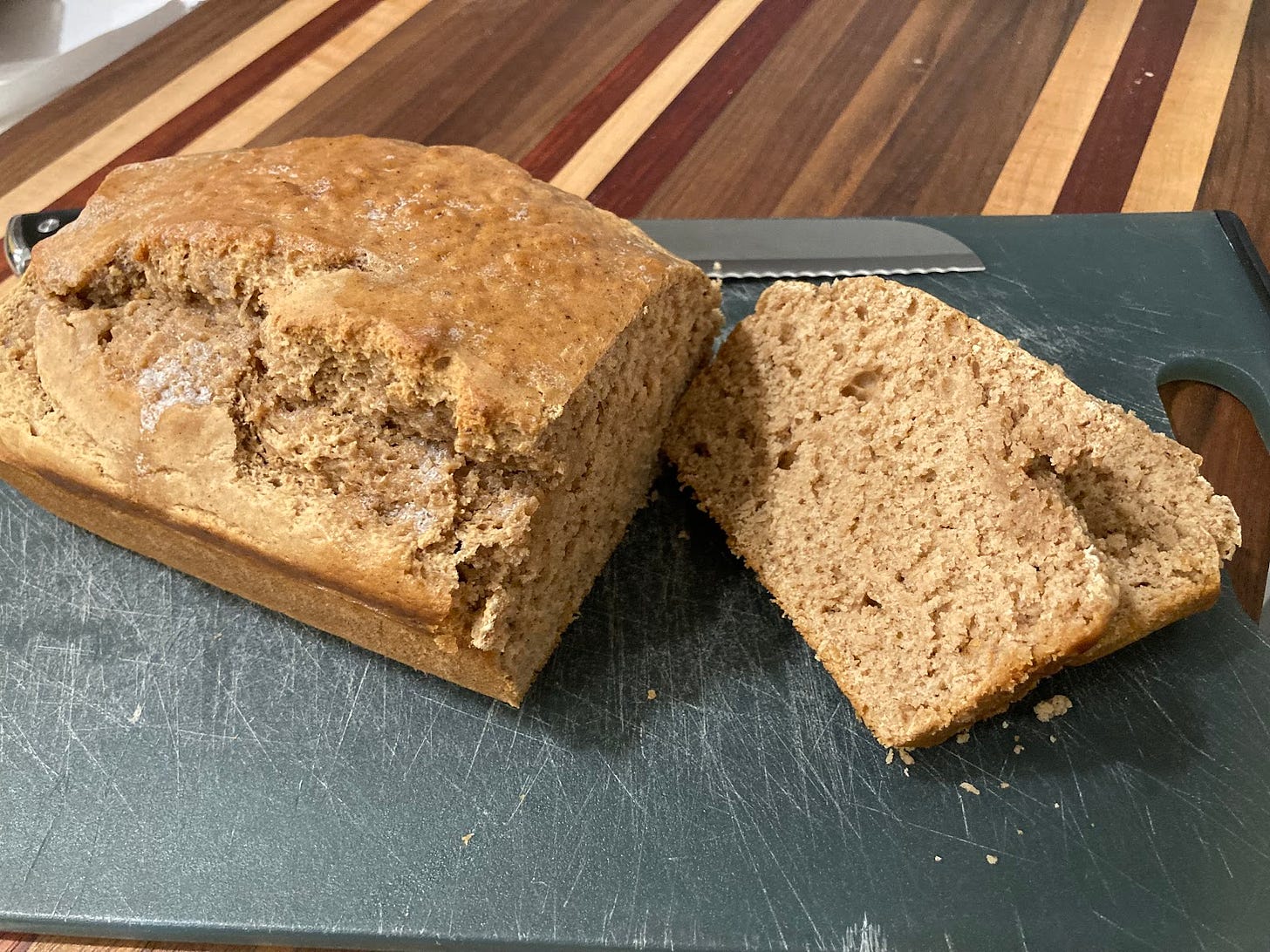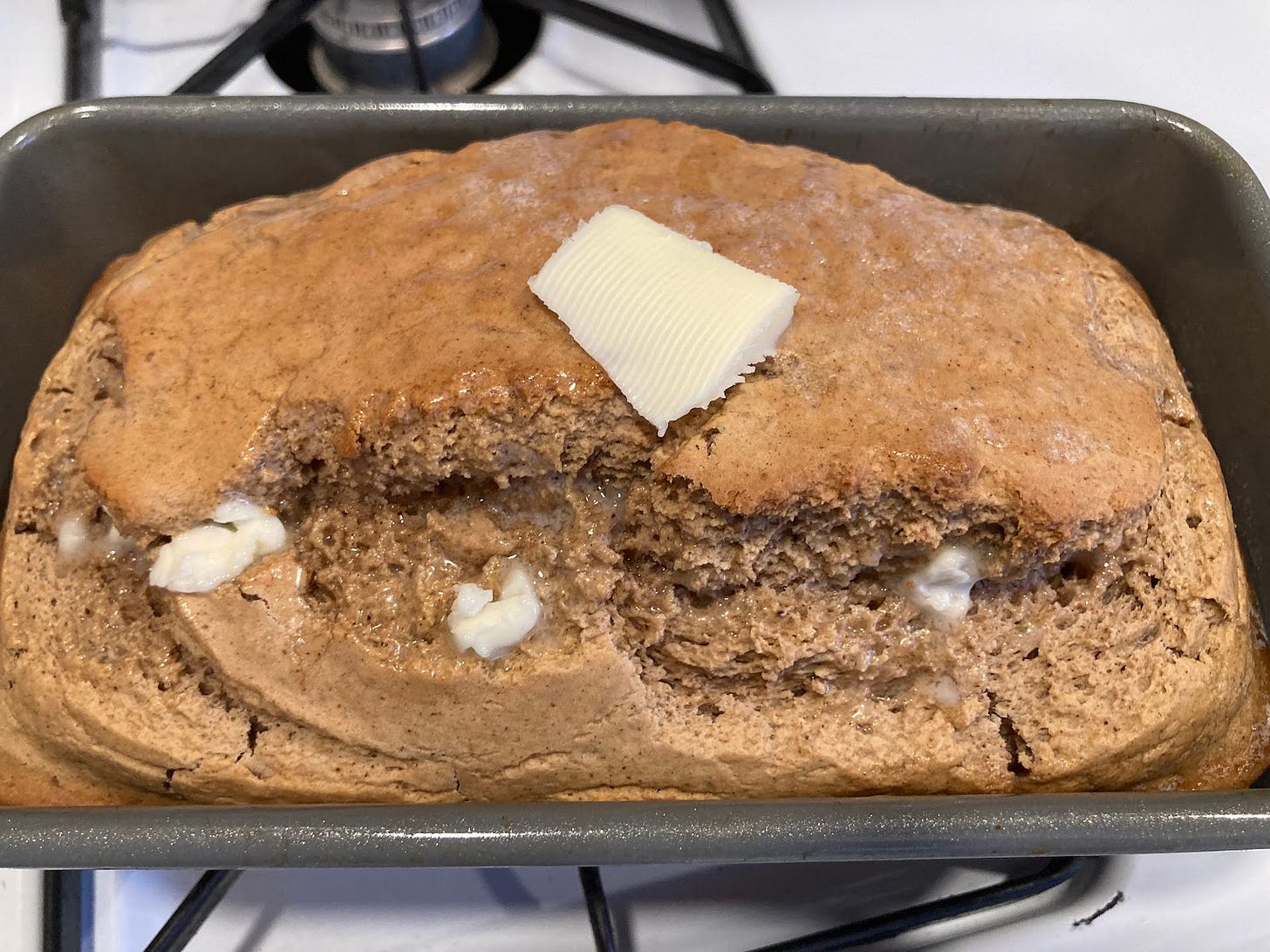
WARNING – This is going to be a bit different from my usual work and with a more informal (and dry) tone as I attempt to do the impossible: weave together Autism, parenting, liturgical living, behavior analysis, and beer bread recipes. For years, scholars and philosophers have failed at this endeavor (for lack of trying), but for the first time ever, all of these aspects of life will be brought together.
This is a brief intermission to the two-part work on God - The Perfect Behavior Analyst to honor the beginning of a new liturgical year. I’m also breaking all rules by posting this on a Sunday in long-form and without usual channels of editing. One might say this is “unfiltered.”
Quick 101 on Liturgical Living
As Christians, we have a range of affections to which we are invited to experience — contrition for our sins, sorrow with Christ in His Passion, joy with Christ in His Resurrection, joy at His birth at Christmas, eager anticipation for His Second Coming, and more. Is it possible to have all of these affections at once? No, but it would be quite comical to see the facial expression of a person trying to do so.
God has given us seasons during which to emphasize and celebrate these different affections. Living according to these different seasons (i.e., Advent, Christmastime, Easter time, and Lent) in harmony with the Church’s liturgies and overall calendar in our personal lives throughout the week is called “liturgical living.” Breathing with the life-breath of the Church, our hearts are invited to be attuned to particular mysteries of our faith. Then the many rooms and caverns of our souls’ hearts open up to light and exercise muscles of affection previously unstretched.
We are embodied souls living in time and space, so our deeper experiences will not generally occur as abstractions or mere thoughts. Our hearts are reached rather through Christmas Carols, lighting scented candles and incense, decorating trees, walking Stations of the Cross with accompanying artwork; fasting and feasting; beating our chests in times of contrition and raising our hands in times of praise; covering our heads with ashes, and at other times anointing them with oil. We are a smells-and-bells kind of people. God gave us senses so we could sense the sensational! Then, in experiencing what is passing, we can see how it points to the everlasting. How generous our God is.
Parents … or Really Anyone: Stop Comparing
It can be intimidating to consider how to make your home a “little Church” where you can domesticate some of the grand liturgies of the Church or practice popular traditions being promoted on different Catholic media outlets … like this one. I know I can get discouraged when I see beautiful displays of liturgical beauty in the homes of my friends. I then wonder how I can find the time to create something just as beautiful and, more importantly, do something that functions in such a way that my children might love Jesus more. My children are ages 7, 5, 3, and 1 year old. I have odd children, in that regard, but one day they will even out. Nonetheless, they are young enough to make it a challenge in recruiting their attention. I’m glad more Catholic “celebrities” out there have been touting how messy their family prayer can be and I’m grateful for their witness.
I also work with children with Autism and wonder how some of them experience wonder and awe in response to the liturgies that surround them within whatever faith background their families have. Speaking to these parents and to all parents of young children, I would like to say this: set your expectations low for seeing any visible interest from your child, but have great faith that God is providing His grace in conjunction with your efforts.
So much of what we do for our young kids is aimed at providing positive emotional experiences surrounding what is of actual value. We do these practices in hopes that the feelings of euphoria will be a seed for coming to value these traditions themselves. At the very least we don’t want there to be an aversive experience associated with valued traditions and faith-based practices.
If positive experiences are associated with passing on the faith, then does that mean “the more positive experiences the better?” That’s a tempting thought, especially for well-meaning parents who want to pass down the faith. However, the number of activities does not matter most. What matters more is how lovingly the activity is done and how well it fosters a healthy relationship with God.
Let’s Get Practical
Liturgical living does not mean you need to do 10 hours of preparation with multi-modal sensory activities across arts and crafts, specially made meals, field trips, or sitting down for a long prayer written in Latin. All of these things can be amazing and helpful, but they are often unrealistic for parents of young children and for parents of children with disabilities. However, don’t let that stop you if you are one of those rare types who has the availability and wherewithal to execute plans of vast proportion. Also … teach me your ways. If you are a parent of a child with special needs, I recommend you check out this very short, but insightful read “Preparing for Christmas as a Special Needs Parent” from Jen Soehnlin at Embracing This Special Life.
I am part of a marriage support group called “Cana Group” in which my wife and I share and collaborate about our personal experiences with five other couples. We have been meeting together about once a month since 2016. It includes some of my brothers in Youth Apostles with whom I already have a particular relationship, but we all have a deep bond with one another in sharing our fears, desires, intentions, failings, successes, and joys. In 2018, one of our discussions was on liturgical living. Below is a downloadable resource my wife and I created for that discussion. In it we calendar our family members’ feast days, baptismal days, Confirmation anniversaries, and any other excuse to celebrate throughout the year, remembering on which days God broke into our lives with Sacramental grace. I have removed some of the more personal aspects so that you have more of a blank canvas to make your own family (or household) calendar.
Also, I have attached a document outlining some bullet point ideas for how to live liturgically for various feasts and seasons throughout the year. If you are the creative type and a junkie for ideas, the link below is for you.
If you want some quick and easy tips, here are 7 very brief practicals to get you started, because I want you to get to the part about beer bread which is the real reason we are all here … or I’m projecting my thoughts and feelings onto you.
Let’s start with the most basic and fundamental step which will already be a win (and a doorway to more wins): Say, “Happy ______ Day!” – just mark the most special days on the calendar and acknowledge the day by simply saying it. Hearing “happy Baptism day,” “Happy feast day,” etc. is awesome! Particularly for Baptisms and Confirmations, I think it communicates the importance of these Sacraments to the one hearing it. Sponsors and godparents, you “liturgically live” life to the full when you call up or send a card to your “sponsees” and godchildren.
Have dessert. If you already have dessert every night, make it extra special. Say why you are having this uncommon treat. Similar to dessert, maybe you can provide another (healthier) activity which is not usually available. Maybe it is going to the playground with your child (or by yourself). Maybe it is something special for a spouse or roommate. If you live alone, try to get out and celebrate with others.
Pace yourself. And yes, I’m talking about Advent. It doesn’t mean we need to forgo anything having to do with Christmas until Dec. 25th. Our simple effort as a family is to put lights out on Gaudete Sunday of Advent. We also decorate our Jesse Tree we received from my wife’s cousins who made them by hand!
Extend the partying to the end of the Christmas season (the party does not end on Christmas or even the day after). Check out the liturgical calendar of your church to realize just how much partying you should be doing.
Still talking about Christmas, don’t do it all. If you are like me and have a big list of all the things that need to be done in order to have a satisfactory celebration, then it is most likely good for us to decisively only pick some things from that list. This protects us from unnecessary stress, fatigue, and disappointment.
Lent: Have your kids color the Stations of the Cross (no matter how shoddily) and then tape those works of art around your living room. A reminder to pray some or all of the Stations of the Cross together as a family – or they are just good to look at – there is merit in just decorating because what we see regularly can change our inner sight gradually.
Easter – same as Christmas – you are commanded to party, feast, and make merry. It may sound impossible, but try to be even more festive during the Easter Octave and season than during Christmas. In the spirit of simplicity, you could commit to saying “Alleluia” at the end of grace before meals. If you are not saying grace before meals, please start doing that. How else can you weave in “Alleluia” to family routines? More to the point, weave in simple add-ons or sacrifices into what you are already doing on a regular basis. From a behavior-analytic standpoint, it will usually lead to more success than trying to start something from scratch.
Beer Bread (for People Who Don’t Bake)
I don’t know how to bake. I’ve always been intimidated by an oven. The immediate visual feedback of seeing food cooked to a certain color on a skillet or even a grill has always been preferable to me, as opposed to the trust I need to have in throwing the food in some hot box that supposedly will do all the work for me. One might say I have oven-trust issues. Even a crock pot is more up my alley since I can see inside and there are only two settings (5 or 6 hours on high heat and 8 hours on lower heat), whereas an oven has many different temperatures and many possible times. My chemistry knowledge has atrophied at this point and I have never had a strong foundation of baking skills in the Clem household – just a knack for eating baked goods.
As I continue to delay you from accessing beer bread recipes – that is if you’re still reading this – I would like to share a simple man’s reflection on how beer bread relates to liturgical living, parenting, and even behavior analysis:
You don’t need a lot of ingredients — simplicity is beautiful.
You may need to add water to get the right consistency. Learn to adapt to the unexpected.
Function matters more than form as long as the function itself matters at all. In other words, it might taste better than it looks.
Beer bread can be an occasion for us to delight in and have gratitude for the richness of our lives and of creation. They can be as complex in flavor as the beers from which they are made.
“Expired” or undrinkable beer does not need to be thrown away. Sometimes, things can be given a different job with which they can be successful, so don’t throw the baby out with the bathwater.
Autism is often associated with higher degrees of food selectivity, especially for beige or brownish colored foods. Every now and then, it’s OK to follow the lead of our artistic children who tell us there is a comforting reliability in bread!
Chat with me in the comments if you see the connections!
On to the recipes for non-bakers!
I have only committed to memory one thing that requires baking – beer bread. I have my mother-in-law to thank. She mentioned it one year while we were together, and I asked for the recipe. I remember her saying “it’s super easy to make” and I thought “yeah right, it needs an oven, so I doubt it.” Yet, when I saw the recipe, I was amazed that there really were only a few ingredients:
3 cups of self-rising flour
½ cup of sugar
1 bottle of beer
Rub butter on top of the bread after it is baked (no set amount but maybe 1 tbsp would be enough)
For the beer, a general rule of thumb is to check what flavors have been included in the brew, especially if you decide to add any spices. For example, if you are using Guinness or Sam Adams Chocolate Bock, these have a particular chocolatey character, so I would not add lemon extract or other conflicting flavors. More on that in the last section on festive beer bread.
Another note on beer alluded to earlier: it can be expired! At this point I have now woven in the topic of environmental sustainability so this article has now officially taken on a life of its own. In all honesty, I abhor throwing things away, so this is one of my favorite aspects of beer bread. It’s also one of the reasons I love when my wife uses overly ripe bananas for banana bread using Joanna Gaines’ recipe (warning: much more than 3 ingredients). Order the food you will eat and use, and ideally have a back up plan for how to use it if it is starting to “go bad.”
For someone who truly does not bake independently (i.e., I call my wife to ask for oven instructions if I am forced to bake something for dinner or I watch a Gordon Ramsay video on repeat), I was very grateful for my mother-in-law’s recipe. Perhaps she knew about my oven-trust issues and baking skills deficit. Additionally, I was very touched to be brought into the “beer-bread-baking” family tradition on my wife’s side. Her family would bake beer bread for celebrating the “Lord’s Day” tradition on Saturdays.
Shameless plug: check out these pictures of my mother-in-law’s cookies at ModMeg’s and my wife’s French macarons at RClemCookies.
Here are the steps to making basic beer bread:
Steps
Preset the oven to 350℉ (175℃). This is famously the only oven temperature that I have memorized.
Put 3 cups of self-rising flour into a mixing bowl that holds all the ingredients with enough room for you to mix (I would use one that holds 10 cups)
Put ½ cup of sugar into the bowl. Whisk the sugar throughout the flour so that the sugar is evenly distributed. It might be unnecessary, but it makes sense in my brain to do that, and remember – I don’t bake.
Optional: seasonings (see the next part of the article for making it “festive”)
Pour in a 12 ounce bottle of beer, slowly. Optional to stir the mixture while you do it
*The “hardest” part is mixing it with a whisk to the right consistency (see the pictures below). If you see lumps and chunks, you need to slowly add a little bit of cold water until the mixture is smooth when you mix it.
If your whisk gets a bunch of the mixture stuck in the inside of the whisk, use a butter knife to “unclog” your whisk.
Get out a loaf pan (8 ½ x 4 ½ x 2 ½ inches) and coat it generously with non-stick spray.
Pour the smooth mixture into the loaf pan. Scrape that bowl clean with your whisk so that nothing is wasted, because … you know … environmental sustainability.
Another optional step?! Sprinkle more seasoning on top using one of the variant recipes
Pop that in the oven for 50-60 minutes.
Ding! Bring it out and immediately (safely) rub the end of a butter stick on it or however you want to apply butter to the top.
Serve as is or with added butter, pumpkin butter, apple butter, or jam.
Making Beer Bread Festive
The process above is for general beer bread, but below are the ingredients which you can throw into your beer bread batter before you move it from the mixing bowl into the loaf pan. Do these at your own risk because I have not done all of these.
Also, you will notice I say “parts” instead of giving exact measurements. This is partly to frustrate you on purpose, but I also just don’t know. I “eyeball” these ratios and amounts. If you really want some specific measurement, go ahead and replace the word “part” with “teaspoon” or “½ teaspoon” in order to play it safe.
Any-Occasion Autumn Bread
This is my favorite variation and I like to use it for celebrating any festivity in the Fall. It was a big hit at my kids’ birthday party yesterday.
3 parts cinnamon
1 part clove
1 part nutmeg
1 part allspice
1 part ginger (optional)
Beer: I like to use yam-based beers and pumpkin beers, but a regular beer works fine.
Great served with pumpkin butter
Advent & Christmas Bread
Almost identical to the “Any-Occasion Autumn Bread,” this one emphasizes clove, orange, and ginger notes so that we have a more wintry character to this bread.
3 parts cinnamon
2 parts clove
2 parts ginger
1 part nutmeg
1 part allspice
A sprinkle of orange zest
Beer: I like to use Sam Adams Winter Lager or similar beers that have orange notes like Shock Top
I wonder how this would taste with cranberry jam
Lenten Bread
Admittedly, I have not tried this yet, but you all can keep me accountable to try this at least once during this upcoming Lent.
Skip the sugar in the main recipe
Beer: choose a cheap one that you have lying around that’s not even worth drinking, or a really good beer which you might prefer to drink (as a sacrifice)
I dare you to sprinkle ashes in it (as long as the ash is edible)
Easter Morning Bread
After a penitential Lent, it’s great to have something with bright notes and to get us thinking about Spring and Summer as signs of Christ bringing the joy of His Resurrection into the world.
A sprinkle of lemon zest or lemon extract
1 part poppy seed (optional)
Beer: Sam Adams Summer Ale or a fruity-flavored beer, but I would not use a sour or IPA personally.
Year-Round Chocolate Beer Bread (“Chocolate Guinness Bread”)
I enjoy drinking dark beers like chocolate bock or stout beer (i.e., Guinness), but I can’t have too many of them within a week or even a month. I’m usually good with one or two, particularly in the winter. What can I do with the leftover beers? Let’s have chocolate which is great all year. Plus, I needed to have something for the Summer besides the “Easter Morning Bread.”
I would be cautious adding actual chocolate during the baking process – the oven temperature is not too high to cause burning, but it sits in the oven for a good while. Best to play it safe and wait until the bread is out of the oven, create a slit longways to stuff in mini-chocolate bars if you really need that chocolate fix. Remember, though – I’m not a baker.
Beer: Chocolate-flavored beers, stouts, bocks (some have coffee and other complementary flavors)
Beer (cont.): Guinness deserves its own category and this is an obvious pick for having “Chocolate Guinness Bread” on St. Patrick’s Day. Reminder: this is not cake, but if you want to go in that direction with Bailey’s-infused icing drizzled on top, look up other recipes online like the one from Family Fresh Meals!
May God bless you for reading (or even skimming) this far.
Sincerely,
The Catholic Behavior Analyst
If you liked this article, please consider sending $1 or more to my wife, Rachel. Any donations go directly to her because she is the one who makes sacrifices for me to write. You can Venmo her at @Rachel-Clem-2
Bio & Disclaimer:
Joseph (Joey) Clem is a Catholic licensed behavior analyst in Virginia. He is a husband, father, and lifetime full member in Youth Apostles. He works primarily with children diagnosed with Autism and volunteers in youth ministry. This article does not constitute professional advice or services. All opinions and commentary of the author are his own and are not endorsed by any governing bodies, licensing or certifying boards, companies, or any third-party.













I must admit, there is often a lot of shame involved in raising disabled children. So many people have expectations for how children ought to behave and be raised. Grace is rarely extended for how routines and spiritual disciplines may need to be adapted or delayed when raising autistic, ADHD, PDA, etc. children. This is also an area of interest for me.
OH. OH MY GOODNESS. Thank you for putting words to the beauty of liturgical living! The passing pointing to the everlasting. Yes!!
I'm also a big believer that God fills in the gaps and is working silently in all those in-between spaces. Isn't it funny how pride drives me to think I must properly/thoroughly curate xyz for my kids to really "get it"? It's a tendency I've been trying to push against for awhile, probably in part due to social media...and a proclivity to want to somehow control experiences. Yikes. That's where paring it down to the basics - are we loving God, loving our neighbor? Is what we're doing helping to foster that, or is it puffing up my pride? - has helped me so much over the years.
Kudos and well-played on the dad joke. Also, I've found that my chemistry knowledge has atrophied too. Ah well!